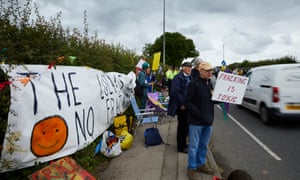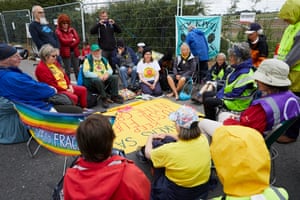Extract from The Guardian
Quakers in a silent prayer circle at
Reclaim the Power’s anti-fracking demonstration. Photograph: Christopher Thomond for the Guardian
The protesters, often several hundred strong, claim they manage to thwart or at least delay deliveries to the site most days. Cuadrilla disagrees, saying its work remains “unimpacted”. The only people they are frustrating are local drivers, a spokeswoman suggested. Several times a week the police close one lane of the road to deal with a steady stream of “lock-ons” – devices built from layers of plastic, bitumen and concrete – which often take several hours to remove.
Back in May, Bob Dennett, 69, was arrested for the first time in his life when he locked on at the gate, along with 11 others. While he waits for his court date to fight charges of obstruction of the highway and an obscure trade union law violation, he spends each day either at one of the three nearby protest camps or at Cuadrilla’s gate.
“This has been my life for the past six years,” Dennett said. “I have 10 grandchildren who live around here. That’s why I do this.”
Preston New Road is pivotal to the anti-fracking fight, said Dennett, who claims to have lost £50,000 because of a collapse in house prices near the drill site.
Cuadrilla is racing its rival, Third Energy, which has a site in Kirby Misperton, North Yorkshire, to be the first gas exploration company to frack since a moratorium was imposed following an earthquake on the Fylde coast during earlier test drilling in 2011.

Anti-fracking protesters at Little Plumpton. Photograph: Christopher Thomond for the Guardian
Initially, many local residents were wary of the full-time activists who set up the protection camps by Preston New Road. Now the groups seem to mingle happily, sharing big vats of lentil dal and bulgur wheat pilaf cooked by a community kitchen and eaten by the side of the road.
Jan Goss, a mindfulness teacher from nearby Lytham, started visiting the protest a few months ago. Now she offers free relaxation sessions to stressed-out protesters. “Last night I did a deep relaxation with someone who had come for 10 days. He had been sworn at and spat at by a person passing on a pushbike. He was saying how stressful it had been. This was a grown man in tears because of all the abuse he has been getting,” she said.
About two-thirds of passing motorists are supportive, reckons Goss, with more people honking horns and offering thumbs-up than “flicking Vs and offering other choice signs”. She has found a wonderful community at the gate, she said, “despite people shouting ‘get a job’ and ‘get a bath’.”
The latest protests have received visitors from trade unionists and renewable energy practitioners as well as a Native American from Standing Rock in North Dakota, who had protested against an oil pipeline being built very close to an Native American reservation.
William Hawk had a stark warning for the Lancastrians, after claiming the water supply in Standing Rock would be contaminated by the pipeline. “It’s going to happen here. Your water supply is going to be destroyed and your children will have nothing to live for,” he said, before singing a song which moved some protesters to tears. Cuadrilla insists it will protect water resources, including groundwater aquifers.
Another visitor was Rick Guest, 67, who was dressed as Gandalf. Last year he walked from his home in Hereford to Downing Street to lobby the government against fracking, dressed again as the Tolkien character. He’d come to Lancashire just for the day because “this is the beginning of it,” he said. “This is the epicentre of the fracking industry, where it’s going to start. If we can stop it here, we can hopefully stop it everywhere.”
It
is a battle that has gone on for years, pitting tireless local
residents and environmentalists against a major gas exploration company
hoping to get rich – and solve a future energy crisis – by fracking
under the Fylde coast.
Last October the government overruled Lancashire county council and gave Cuadrilla the green light to begin drilling, but anti-fracking activists have refused to give up their fight.
Throughout July, protesters from around the UK have joined worried locals on an A-road just outside Blackpool for a month of “rolling resistance”. The aim: to make life as difficult as possible for Cuadrilla and its contractors as they attempt to build two wells in a 1.5-hectare (3.8-acre) field on Preston New Road.
One morning last week, direct action began at dawn when two cars screeched into the site entrance, surprising Cuadrilla’s security guards as well as police officers stationed there 24 hours a day – at a cost of well over £100,000 most months.
The drivers quickly departed, according to police. In each car was a protester, one man and one woman, each locked on to a large and heavy object.
For hours the pair sat in the back seats until officers persuaded
them to unlock themselves, Sgt Paul Patterson from Lancashire police
said. Neither was arrested, but during the stand-off a big crowd
gathered, blocking the road, he said.

Last October the government overruled Lancashire county council and gave Cuadrilla the green light to begin drilling, but anti-fracking activists have refused to give up their fight.
Throughout July, protesters from around the UK have joined worried locals on an A-road just outside Blackpool for a month of “rolling resistance”. The aim: to make life as difficult as possible for Cuadrilla and its contractors as they attempt to build two wells in a 1.5-hectare (3.8-acre) field on Preston New Road.
One morning last week, direct action began at dawn when two cars screeched into the site entrance, surprising Cuadrilla’s security guards as well as police officers stationed there 24 hours a day – at a cost of well over £100,000 most months.
The drivers quickly departed, according to police. In each car was a protester, one man and one woman, each locked on to a large and heavy object.

The protesters, often several hundred strong, claim they manage to thwart or at least delay deliveries to the site most days. Cuadrilla disagrees, saying its work remains “unimpacted”. The only people they are frustrating are local drivers, a spokeswoman suggested. Several times a week the police close one lane of the road to deal with a steady stream of “lock-ons” – devices built from layers of plastic, bitumen and concrete – which often take several hours to remove.
Back in May, Bob Dennett, 69, was arrested for the first time in his life when he locked on at the gate, along with 11 others. While he waits for his court date to fight charges of obstruction of the highway and an obscure trade union law violation, he spends each day either at one of the three nearby protest camps or at Cuadrilla’s gate.
“This has been my life for the past six years,” Dennett said. “I have 10 grandchildren who live around here. That’s why I do this.”
Preston New Road is pivotal to the anti-fracking fight, said Dennett, who claims to have lost £50,000 because of a collapse in house prices near the drill site.
Cuadrilla is racing its rival, Third Energy, which has a site in Kirby Misperton, North Yorkshire, to be the first gas exploration company to frack since a moratorium was imposed following an earthquake on the Fylde coast during earlier test drilling in 2011.

Initially, many local residents were wary of the full-time activists who set up the protection camps by Preston New Road. Now the groups seem to mingle happily, sharing big vats of lentil dal and bulgur wheat pilaf cooked by a community kitchen and eaten by the side of the road.
Jan Goss, a mindfulness teacher from nearby Lytham, started visiting the protest a few months ago. Now she offers free relaxation sessions to stressed-out protesters. “Last night I did a deep relaxation with someone who had come for 10 days. He had been sworn at and spat at by a person passing on a pushbike. He was saying how stressful it had been. This was a grown man in tears because of all the abuse he has been getting,” she said.
About two-thirds of passing motorists are supportive, reckons Goss, with more people honking horns and offering thumbs-up than “flicking Vs and offering other choice signs”. She has found a wonderful community at the gate, she said, “despite people shouting ‘get a job’ and ‘get a bath’.”
The latest protests have received visitors from trade unionists and renewable energy practitioners as well as a Native American from Standing Rock in North Dakota, who had protested against an oil pipeline being built very close to an Native American reservation.
William Hawk had a stark warning for the Lancastrians, after claiming the water supply in Standing Rock would be contaminated by the pipeline. “It’s going to happen here. Your water supply is going to be destroyed and your children will have nothing to live for,” he said, before singing a song which moved some protesters to tears. Cuadrilla insists it will protect water resources, including groundwater aquifers.
Another visitor was Rick Guest, 67, who was dressed as Gandalf. Last year he walked from his home in Hereford to Downing Street to lobby the government against fracking, dressed again as the Tolkien character. He’d come to Lancashire just for the day because “this is the beginning of it,” he said. “This is the epicentre of the fracking industry, where it’s going to start. If we can stop it here, we can hopefully stop it everywhere.”

No comments:
Post a Comment